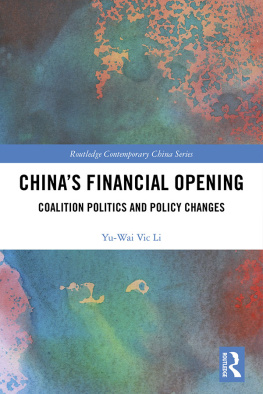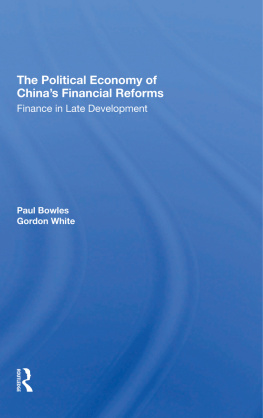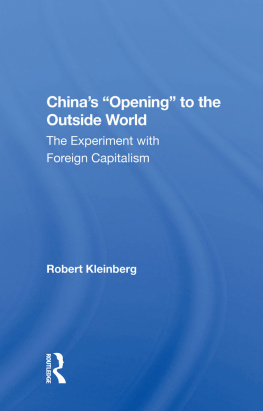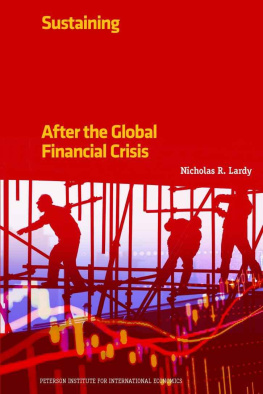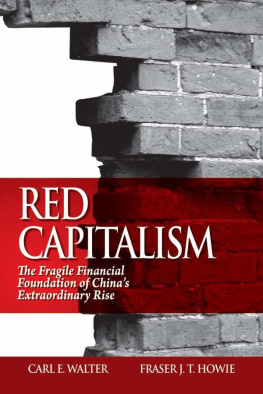Chinas Financial Opening
The twenty-first century has not only seen China become one of the worlds largest trading nations, but also its gradual integration into the global financial system. Chinese-sponsored project financing schemes, such as the Belt-and-Road Initiative and the Asian Infrastructure Investment Bank, and the expanding international footprint of the renminbi, have raised the specter of Beijing shaping established market rules and practices with its financial firepower. These dramatic developments beyond the Great Wall of Money have overshadowed the equally remarkable opening of Chinas domestic capital markets. These include initiatives that make cross-border equity trade and investment easier; attempts to internationalize exclusively domestic-oriented equity markets; and creation of the first offshore renminbi hub in Hong Kong, paving the way for the big bang of renminbi use worldwide.
Li interrogates the domestic political dynamics underlying the dizzying switches between liberalization and restriction. This book argues that the interplay between the pro-opening coalitions and dissenting parties has been central to the policymaking process. Financial opening has not only been driven by central bureaucratic actors, but also by financial industry interests and the local authorities of financial centers acting in concert as coalitions. The local and financial constituents have shaped policy agendas and priorities, and defined and framed liberalizing initiatives in ways that appealed to bureaucratic entities. They also sought wider political support by capitalizing on connections with top decision-making elites. To allay opposition and maintain political and technical consensus, the coalition constituents have offered concessions to dissenting parties over implementation specifics. This, however, has not always succeeded. Dissenting parties who recognized adverse distributional and policy risk implications inherent in the opening initiatives might decline concessionary offers, leading to policy tendencies other than opening.
As one of the very first political economy contributions to studies of Chinas financial opening from the 2000s, this book will appeal to researchers of international political economy, East Asia and China specialists, and financial practitioners and policymakers wanting to make sense of the countrys liberalizing logic.
Yu-Wai Vic Li is an assistant professor in the Department of Social Sciences at the Education University of Hong Kong. He specializes in international political economy and focuses on Chinas financial opening and renminbi internationalization, and the East Asian politics of financial regulation since the 2008 crisis.
Routledge Contemporary China Series
For our full list of available titles: www.routledge.com/Routledge-Contemporary-China-Series/book-series/SE0768
Deng Xiaoping and Chinas Foreign Policy
Ronald C. Keith
Corporate Social Responsibility Reporting in China
Evolution, Drivers and Prospects
Jieqi Guan and Carlos Noronha
Chinas Generation Gap
Jiaming Sun and Dongmei Cheng
China Reclaims World Power Status
Putting an end to the world America made
Paolo Urio
The Economic Roots of the Umbrella Movement in Hong Kong
Globalization and the Rise of China
Louis Augustin-Jean and Anthea H.Y. Cheung
Chinas Hydro-politics in the Mekong
Conflict and Cooperation in Light of Securitization Theory
Sebastian Biba
Economic Policy Making in China (19492016)
The Role of Economists
Pieter Bottelier
The Power of Relationalism in China
Leah Zhu
Chinas Financial Opening
Coalition Politics and Policy Changes
Yu-Wai Vic Li
First published 2018
by Routledge
2 Park Square, Milton Park, Abingdon, Oxon OX14 4RN
and by Routledge
711 Third Avenue, New York, NY 10017
Routledge is an imprint of the Taylor & Francis Group, an informa business
2018 Yu-Wai Vic Li
The right of Yu-Wai Vic Li to be identified as author of this work has been asserted by him in accordance with sections 77 and 78 of the Copyright, Designs and Patents Act 1988.
All rights reserved. No part of this book may be reprinted or reproduced or utilized in any form or by any electronic, mechanical, or other means, now known or hereafter invented, including photocopying and recording, or in any information storage or retrieval system, without permission in writing from the publishers.
Trademark notice: Product or corporate names may be trademarks or registered trademarks, and are used only for identification and explanation without intent to infringe.
British Library Cataloguing-in-Publication Data
A catalogue record for this book is available from the British Library
Library of Congress Cataloging-in-Publication Data
Names: Li, Yu-Wai Vic, author.
Title: Chinas financial opening : coalition politics and policy changes / Yu-Wai Vic Li.
Description: Abingdon, Oxon ; New York, NY : Routledge, 2018. | Series: Routledge contemporary China series | Includes bibliographical references and index.
Identifiers: LCCN 2017055960| ISBN 9781138727540 (hardback) | ISBN 9781315190792 (e-book)
Subjects: LCSH: FinanceGovernment policyChina. | ChinaEconomic policy2000 | ChinaPolitics and government2002
Classification: LCC HG187.C6 L52725 2018 | DDC 332.0951dc23
LC record available at https://lccn.loc.gov/2017055960
ISBN: 978-1-138-72754-0 (hbk)
ISBN: 978-1-315-19079-2 (ebk)
Typeset in Galliard
by Wearset Ltd, Boldon, Tyne and Wear
To my parents and Ka Chuen
Acknowledgments
Chinas capital market developments always seem to be an enigma to many market participants inside and most observers outside the country. The problem goes beyond the challenge of understanding the Chinese language and deciphering the policy rhetoric of Chinese officialdom, and often has to do with the surprising decisions, and the unexpected turns of policy before implementation. This book aspires to disperse the fog that obscures the Great Wall of Money and illuminate the financial policymaking process. It centers on three aspects of Chinas financial opening, including the liberalization of the outbound equity investment regime, the attempts to internationalize the domestic stock market, and the emergence of an offshore renminbi center in Hong Kong.
The project stems from a pre-global crisis discussion I had in 2007 with my academic colleagues about the financial development of China. On the watch-list were several issues, but none of us had any sense of how they might unfold or how we might piece them together systematically. What happened then in the global capital market changed Chinese capital market development and the world. I hope this book represents a modest effort that contributes to the original dialogue by showing how the myriad developments of Chinas financial market might be made sense of.
Such a herculean task would not have been possible to complete without the intellectual support of my PhD supervisors, Derek Hall and Eric Helleiner, who have witnessed the projects gestation from the very beginning. They have unremittingly shared with me their deep and extensive knowledge of the literature, and provided me with incisive feedback on my writing. I must also thank the Balsillie School of International Affairs and Wilfrid Laurier University for the generous doctoral fellowships without which I would never have had the chance to savor a great Canadian education experience.


